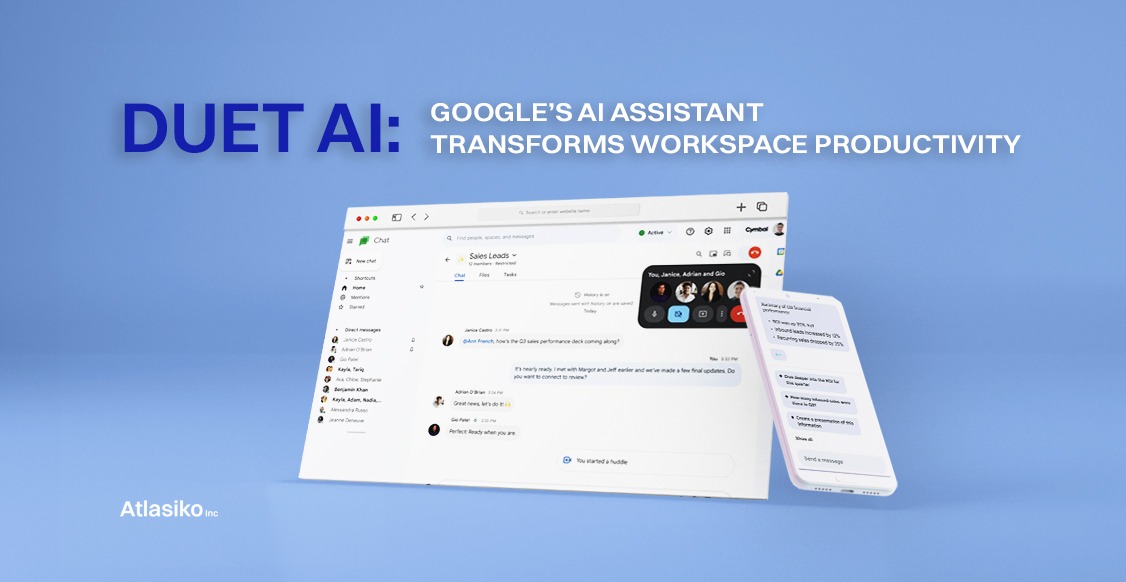Google has taken a significant step in the realm of artificial intelligence with the launch of Duet AI, now accessible to a wider audience. The company declared on Tuesday that Duet AI, its generative AI assistant, is officially available, integrating seamlessly into its suite of Workplace productivity applications. This move places Google in direct competition with Microsoft's upcoming Copilot, as both tools are priced at $30 per user each month.
Google Duet AI leverages the power of genAI to support users across various Workspace products. Its capabilities are diverse and practical, such as autonomously drafting texts in Google Docs based on user inputs, composing email responses within Gmail, and systematically organizing data in Google Sheets. The AI can also efficiently record notes and encapsulate conversations within the Meet video conferencing tool.
The journey to this release began with Google's announcement in March, unveiling its intentions to infuse AI features into Workspace products. The goal was to elevate productivity by automating mundane tasks, thereby streamlining workflow processes. After a public preview period that commenced during the Google I/O event in May, Duet AI was made accessible to users enrolled in the Google Workspace Labs waitlist.
Duet AI is now available as an optional add-on for customers subscribed to the Google Workspace Enterprise pricing tier. This enhancement comes at an extra cost of $30 per user each month. Though Google's enterprise tier pricing is not publicly disclosed, estimations place it between $27 and $36 per user per month. The inclusion of Google Duet AI nearly doubles the per-user monthly cost.
A Google spokesperson revealed that the plan is to expand Duet AI's availability to customers in other pricing tiers over the next few months. A free trial option is also on the table, although specifics regarding trial terms remain undisclosed.
Presently, Duet AI caters to English-speaking users globally wherever Google Workspace is sold. The platform is anticipated to incorporate support for other languages in the near future.
The introduction of Duet AI underscores Google's success in beating Microsoft to the punch in terms of integrating genAI tools into office software suites. Microsoft is actively testing its own AI assistant, Copilot, designed for Microsoft 365 applications like Word, Excel, and Teams. Much like Duet AI, Microsoft's Copilot is set at the $30 per user monthly rate, and it's expected to be launched later this year or in early 2024.
J. P. Gownder, Vice President and Principal Analyst on Forrester's Future of Work team, remarked on the pricing choice for Duet AI. He found it surprising that Google positioned Duet AI at the same price point as Microsoft Copilot, given that Google Workspace is generally regarded as a more affordable alternative to Microsoft 365. Despite this, both offerings promise productivity enhancements, with Google Workspace products offering around 70% to 80% of the features present in Microsoft 365 Office programs.
Although the AI landscape is evolving rapidly, experts like Gownder believe that Duet AI and its Microsoft counterpart have the potential to revolutionize productivity and collaboration software experiences. This transformation is fueled by the ability of these AIs to comprehend and respond to complex natural language commands, thus bridging the gap between humans and software.
Raúl Castañón, Senior Analyst at 451 Research, a division of S&P Global Market Intelligence, noted that Google's pricing strategy for Duet AI reflects its confidence in the tool's impact on knowledge worker productivity. Nonetheless, Castañón advised businesses to approach investments in generative AI tools cautiously, considering the potential learning curve for employees. He suggested deploying these tools in phases, starting with power users before gradually expanding access to the broader employee base.
As the AI landscape expands within office software suites, Nick Patience, Lead Analyst for AI and Machine Learning at 451 Research, speculated about the potential consequences for specialized genAI vendors. Features once exclusive to these vendors, like generating blog posts or compelling email subject lines, are now being integrated into Google Workplace and Microsoft 365. This shift could erode the unique selling propositions of these specialized vendors.
Google took the opportunity to showcase new Duet AI functionalities during its Google Cloud Next conference in San Francisco. The event, held in-person for the first time since the onset of the COVID-19 pandemic, highlighted several innovations designed to enhance Google Meet. These include features like automated note-taking during video calls, quick updates on meeting discussions, and summaries for absent participants.
Additionally, Google Chat users can now engage with a Duet AI chatbot, addressing queries related to shared content within the team messaging application. Users can also request summaries of missed conversations and shared documents. Further updates to Google Chat encompass an improved user interface, enhanced search capabilities, and the addition of "huddles," a lightweight audio and video meeting tool reminiscent of Slack's Huddles.
Regrettably, Google did not provide any updates on the release date for Sidekick, a chatbot assistant announced at Google I/O in May. Sidekick is designed to aggregate information from various Workspace apps, streamlining access to crucial information.
While genAI tools like Duet AI present opportunities for heightened productivity, they also raise concerns about the security and privacy of corporate data. Google, however, has emphasized that customer data will not be utilized to train the Large Language Models (LLMs) underpinning its genAI functionality. These LLMs have been known to occasionally produce inaccurate information, termed "hallucinations," which could pose challenges when handling critical business data. While Google did not disclose details about admin tools to filter genAI content, administrators do have the capability to disable Duet AI functionality for users, ensuring a degree of control over its usage.







